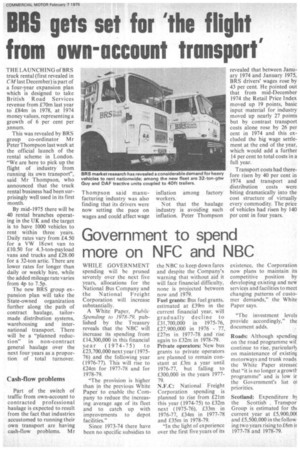IRS gets set for 'the flight
Page 21

If you've noticed an error in this article please click here to report it so we can fix it.
from own-account transport'
THE LAUNCHING of BRS truck rental (first revealed in CM last December) is part of a four-year expansion plan which is designed to take British Road Services revenue from £70m last year t6 £84m in 1978, at 1974 money values, representing a growth of 6 per cent per annum.
This was revealed by BRS group co-ordinator Mr Peter Thompson last week at the official launch of the rental scheme in London. "We are here to pick up the flight of industry from running its own transport", said Mr Thompson, who announced that the truck rental business had been surprisingly well used in its first month.
By mid-1975 there will be 40 rental branches operating in the UK and the target is to have 1000 vehicles to rent within three years. Daily rates vary from £4.50 for a VW Newt van to £10,50 for 4.3-ton-payload vans and trucks and £28.00 for a 32-ton artic. There are lower rates for longer than daily or weekly hire, while the added mileage rate varies from 4p to 7.5p.
The new BRS group expansion plan will take the State-owned organization further along the path of contract haulage, tailormade distribution systems, warehousing and international transport. There will be a "planned reduction" in non-contract general haulage over the next four years as a proportion of total turnover. Thompson said manufacturing industry was also finding that its drivers were now setting the pace on wages and could affect wage inflation among factory workers.
Not that the haulage industry is avoiding such inflation. Peter Thompson revealed that between January 1974 and January 1975, BRS drivers' wages rose by 43 per cent. He pointed out that from mid-December 1974 the Retail Price Index moved up 19 points, basic input material for industry moved up nearly 27 points but by contrast transport costs alone rose by 26 per cent in 1974 and this excluded the big wage settlement at the end of the year, which would add a further 14 per cent to total costs in a full year.
Transport costs had therefore risen by 40 per cent in 1974 and transport and distribution costs were biting dramatically into the cost structure of virtually every commodity. The price of vehicles had risen by 140 per cent in four years.












































































































































